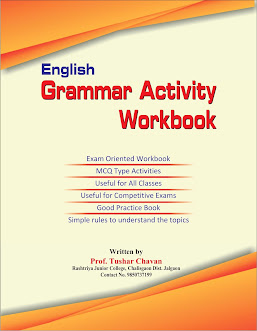Common Mistakes in English
Compiled by-
Revatagaon sir
1. Subject-Verb Agreement
Errors
A lot of people make a mistake in
writing is that the subject and the verb don’t match.
The verb and subject need to
match in number.
If the subject is one person
(singular), the verb must agree and reflect that.
Here’s an example.
Wrong: Our dogs is running in the park.
Right: Our dogs are running in the park.
2. Sentence Fragments
An incomplete sentence is
called a sentence fragment.
If the sentence is missing an
independent clause or a complete verb, it is considered incomplete and is
therefore wrong.
The most common way sentence
fragments occur is when the meaning of a second sentence is based on a previous
sentence.
For example:
Wrong: I don’t like to eat bitter gourd. Because
I dislike the taste.
Right: I don’t like to eat bitter gourd because
I dislike the taste.
3. Misuse of Contractions
and Apostrophes
A lot of people struggle with
knowing when to use a contraction or apostrophe.
Whether the contraction is –
“its” vs “it’s,”
“your” vs “you’re,”
or
“they’re” vs “their” vs “there.”
As a rule, anything that uses
an apostrophe indicates possession or a contraction.
If you can say “it is” or “it
has” instead of “it’s” in a sentence and it still makes sense, then you need an
apostrophe.
Similarly for contractions, if
you can say “you are” in a sentence, then you know you should be using “you’re”
instead of “your.”
Let’s have a look at some
examples.
Wrong: Its cold outside today.
Right: It’s [it is] cold outside today.
Wrong: I don’t understand why your mad, their
the ones who made a mistake.
Right: I don’t understand why you’re [you are]
mad, they’re [they are] the ones who made a mistake.
4. Passive Voice
It’s common to see a passive
voice when the object is put at the beginning of a sentence as opposed to at
the end. When the object is at the beginning, then the verb is happening to the
object instead of the object causing the verb.
In order to correct this
mistake, the sentence needs to be changed to become active. This is a very
common mistake, even for experienced writers, and it’s often difficult to pick
up on. Here are some examples:
Passive: The baby was held by its mother.
Active: The mother was holding her baby.
Passive: The wall was painted by Jennifer.
Active: Jennifer painted the wall.
5. Dangling Modifiers
A dangling modifier is a
phrase, clause, or even a word that is separate from the word it’s meant to
describe or modify.
It makes the sentence sound
awkward and can be confusing to read.
If your sentence isn’t clear
about exactly what is being modified, there’s a mistake in it.
Wrong: Checking in his bag, the book was not
found.
Right: Checking in his bag, he didn’t find his
book.
Wrong: After breaking her leg, it was hard to
walk.
Right: After breaking her leg, Jane found it
hard to walk.



.png)

















0 Comments